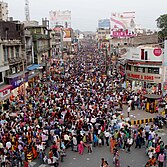
Back Gemeenskap Afrikaans Gesellschaft (Soziologie) ALS ኅብረተሰብ Amharic Sociedat AN مجتمع Arabic ܟܢܫܐ ARC সমাজ Assamese Sociedá AST Cəmiyyət Azerbaijani جامیعه AZB
A society (/səˈsaɪəti/) is a group of individuals involved in persistent social interaction or a large social group sharing the same spatial or social territory, typically subject to the same political authority and dominant cultural expectations. Societies are characterized by patterns of relationships (social relations) between individuals who share a distinctive culture and institutions; a given society may be described as the sum total of such relationships among its constituent members.
Human social structures are complex and highly cooperative, featuring the specialization of labor via social roles. Societies construct roles and other patterns of behavior by deeming certain actions or concepts acceptable or unacceptable—these expectations around behavior within a given society are known as societal norms. So far as it is collaborative, a society can enable its members to benefit in ways that would otherwise be difficult on an individual basis.
Societies vary based on level of technology and type of economic activity. Larger societies with larger food surpluses often exhibit stratification or dominance patterns. Societies can have many different forms of government, various ways of understanding kinship, and different gender roles. Human behavior varies immensely between different societies; humans shape society, but society in turn shapes human beings.
© MMXXIII Rich X Search. We shall prevail. All rights reserved. Rich X Search


